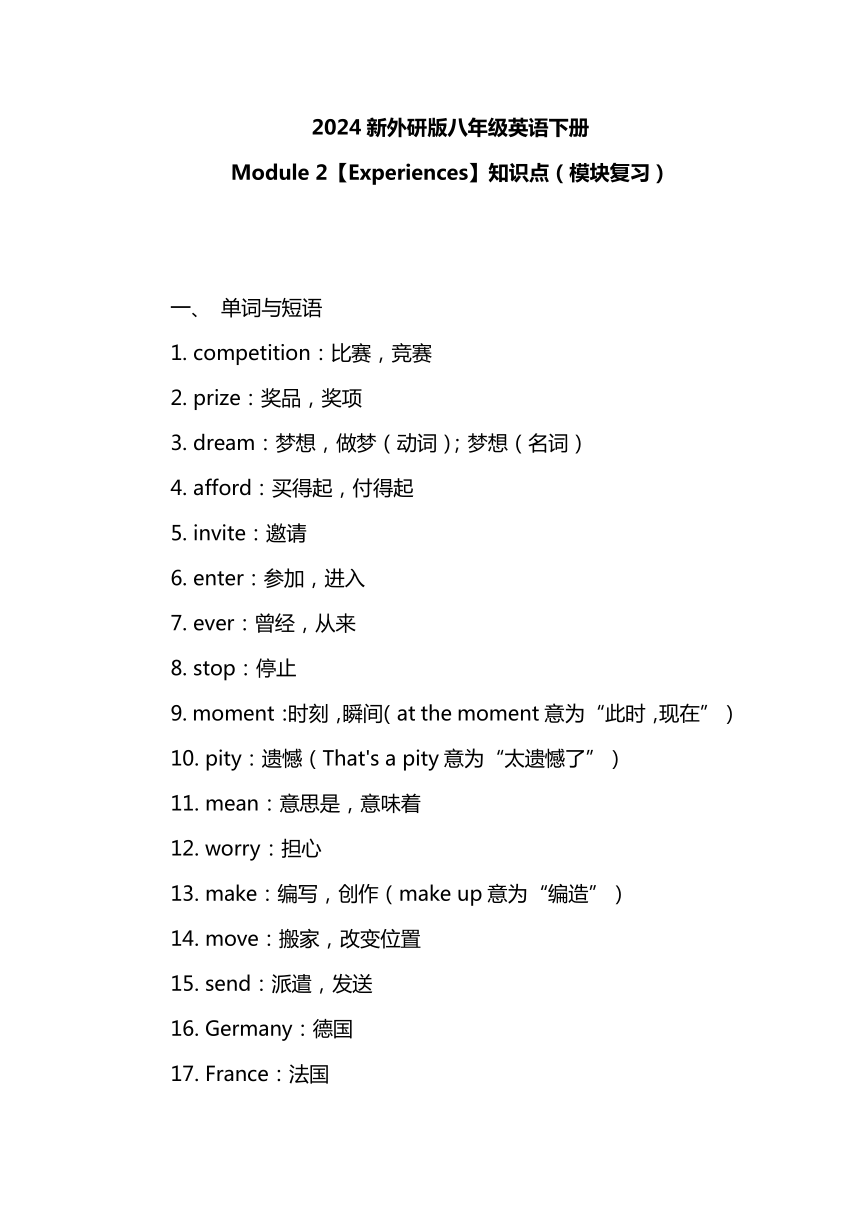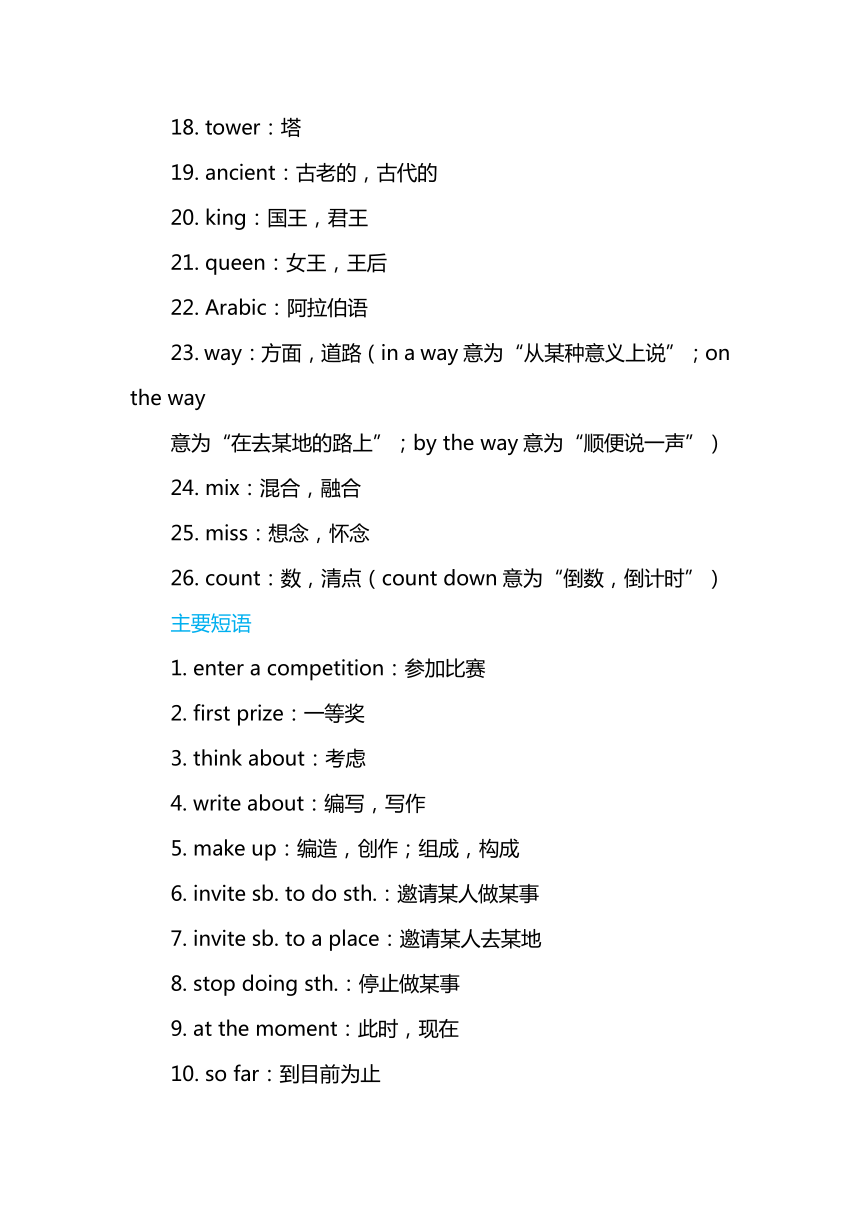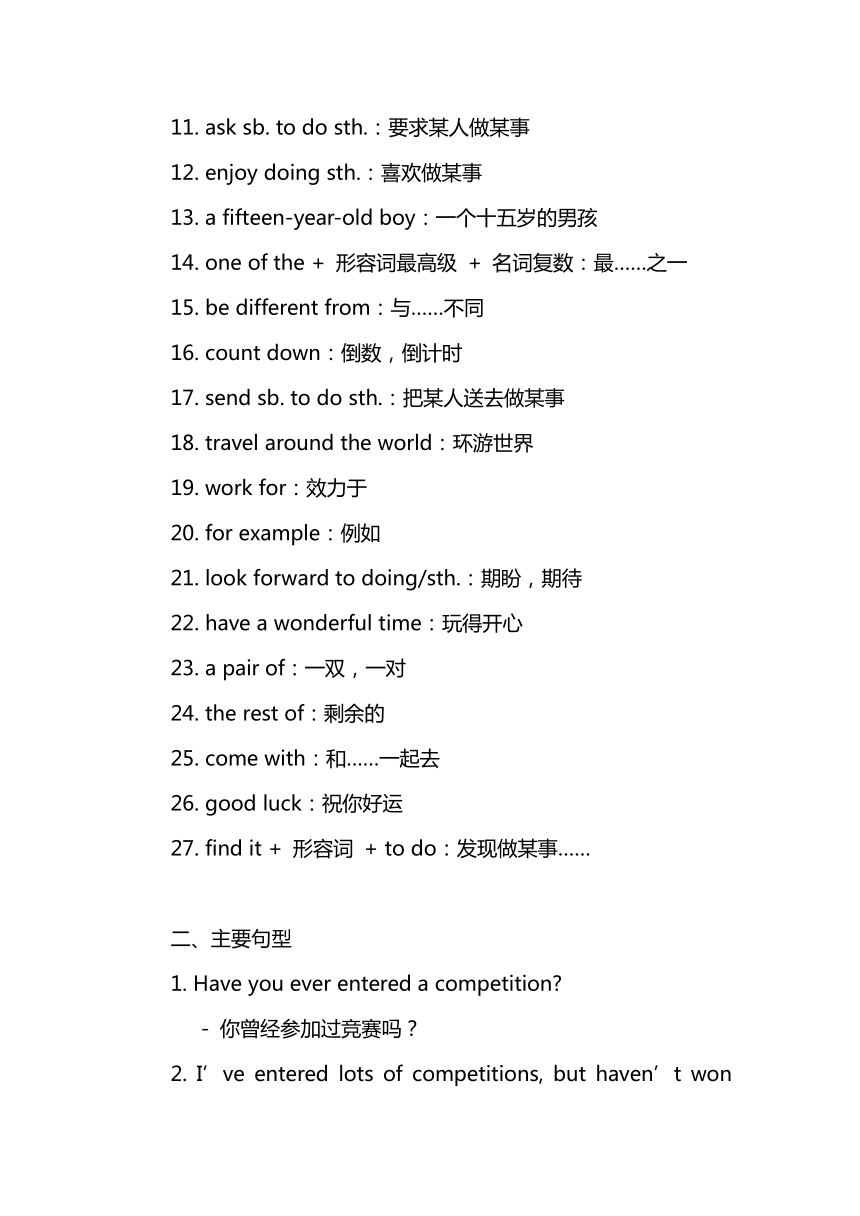Module 2 Experiences知识点总结-2024-2025学年外研版八年级下册英语
文档属性
| 名称 | Module 2 Experiences知识点总结-2024-2025学年外研版八年级下册英语 |

|
|
| 格式 | docx | ||
| 文件大小 | 22.2KB | ||
| 资源类型 | 教案 | ||
| 版本资源 | 外研版 | ||
| 科目 | 英语 | ||
| 更新时间 | 2025-01-05 20:36:58 | ||
图片预览



文档简介
2024新外研版八年级英语下册
Module 2【Experiences】知识点(模块复习)
一、 单词与短语
1. competition:比赛,竞赛
2. prize:奖品,奖项
3. dream:梦想,做梦(动词);梦想(名词)
4. afford:买得起,付得起
5. invite:邀请
6. enter:参加,进入
7. ever:曾经,从来
8. stop:停止
9. moment:时刻,瞬间(at the moment意为“此时,现在”)
10. pity:遗憾(That's a pity意为“太遗憾了”)
11. mean:意思是,意味着
12. worry:担心
13. make:编写,创作(make up意为“编造”)
14. move:搬家,改变位置
15. send:派遣,发送
16. Germany:德国
17. France:法国
18. tower:塔
19. ancient:古老的,古代的
20. king:国王,君王
21. queen:女王,王后
22. Arabic:阿拉伯语
23. way:方面,道路(in a way意为“从某种意义上说”;on the way
意为“在去某地的路上”;by the way意为“顺便说一声”)
24. mix:混合,融合
25. miss:想念,怀念
26. count:数,清点(count down意为“倒数,倒计时”)
主要短语
1. enter a competition:参加比赛
2. first prize:一等奖
3. think about:考虑
4. write about:编写,写作
5. make up:编造,创作;组成,构成
6. invite sb. to do sth.:邀请某人做某事
7. invite sb. to a place:邀请某人去某地
8. stop doing sth.:停止做某事
9. at the moment:此时,现在
10. so far:到目前为止
11. ask sb. to do sth.:要求某人做某事
12. enjoy doing sth.:喜欢做某事
13. a fifteen-year-old boy:一个十五岁的男孩
14. one of the + 形容词最高级 + 名词复数:最……之一
15. be different from:与……不同
16. count down:倒数,倒计时
17. send sb. to do sth.:把某人送去做某事
18. travel around the world:环游世界
19. work for:效力于
20. for example:例如
21. look forward to doing/sth.:期盼,期待
22. have a wonderful time:玩得开心
23. a pair of:一双,一对
24. the rest of:剩余的
e with:和……一起去
26. good luck:祝你好运
27. find it + 形容词 + to do:发现做某事……
二、主要句型
1. Have you ever entered a competition
- 你曾经参加过竞赛吗?
2. I’ve entered lots of competitions, but haven’t won any prize. I’ve stopped trying now.
- 我参加过许多比赛,但从未获过奖。我已经不再尝试了。
3. They are counting down the days.
- 他们在进行倒计时。
4. Have you ever thought about other kinds of competitions
- 你考虑过其他种类的比赛吗?
5. I will invite you to come with me.
- 我将邀请你来跟我一起。
6. Maybe you will win a prize.
- 也许你会得奖。
7. I can’t afford it.
- 我负担不起。
8. What do you mean
- 你是什么意思?
9. They have been to many interesting places.
- 他们去过许多有趣的地方。
10. It’ll help you improve your speaking.
- 它会帮助你提高口语能力。
11. That’s a pity.
- 太遗憾了。
12. I’ve entered an English speech competition.
- 我参加了一个英语演讲比赛。
13. - Don’t worry!
- 不要担心!
三、语法点:
现在完成时
现在完成时表示过去发生的动作或状态持续到现在,并且已经完成,或者对现在造成的影响,可能持续发生下去。
现在完成时由“have/has+过去分词”构成,其中have用于第一人称、第二人称及第三人称复数,而has则用于第三人称单数。它主要用于描述从过去某一时间点开始,一直持续到现在,或者在过去某一时间点完成的动作,该动作对现在仍有影响或结果。
用法
1. 表示过去发生的动作对现在造成的影响或结果:
例如:I have just eaten lunch.(我刚吃过午饭。)这句话表示过去的动作(吃午饭)对现在的影响(现在不饿)。
2. 表示在过去已经开始,并持续到现在的动作或状态:
例如:I have lived here for ten years.(我在这里住了十年了。)这句话表示过去的动作(住在这里)一直持续到现在,并且可能继续持续下去。
3. 与表示不确定的过去时间状语连用:
例如:already(肯定句中)、yet(否定句和疑问句中)、just、before、recently、still、lately、never等。
He has already obtained a scholarship.(他已经获得了一份奖学金。)
4. 与表示频度的时间状语连用:
例如:often、sometimes、ever、never、twice、on several occasions等。
Have you ever been to Beijing (你以前去过北京吗?)
5. 与包括现在时间在内的时间状语连用:
例如:now、up to these few days/weeks/months/years、this morning/week/month/year、just、today、up to present、so far等。
Peter has written six papers so far.(彼得写了六篇论文,到目前为止。)
标志词
现在完成时的标志词有很多,如already、ever、never、since、for、just、yet、recently、once、over、in the past+一段时间等。这些标志词有助于识别和使用现在完成时。
动词过去分词的构成:
大多数动词后直接加ed,如:work—worked
以e结尾的动词加d,如:live—lived
以辅音加y结尾的动词将y变成i加ed,如:try—tried
在重读闭音节中,双写结尾加ed,如:stop—stopped
不规则变化,如:write—written
Module 2【Experiences】知识点(模块复习)
一、 单词与短语
1. competition:比赛,竞赛
2. prize:奖品,奖项
3. dream:梦想,做梦(动词);梦想(名词)
4. afford:买得起,付得起
5. invite:邀请
6. enter:参加,进入
7. ever:曾经,从来
8. stop:停止
9. moment:时刻,瞬间(at the moment意为“此时,现在”)
10. pity:遗憾(That's a pity意为“太遗憾了”)
11. mean:意思是,意味着
12. worry:担心
13. make:编写,创作(make up意为“编造”)
14. move:搬家,改变位置
15. send:派遣,发送
16. Germany:德国
17. France:法国
18. tower:塔
19. ancient:古老的,古代的
20. king:国王,君王
21. queen:女王,王后
22. Arabic:阿拉伯语
23. way:方面,道路(in a way意为“从某种意义上说”;on the way
意为“在去某地的路上”;by the way意为“顺便说一声”)
24. mix:混合,融合
25. miss:想念,怀念
26. count:数,清点(count down意为“倒数,倒计时”)
主要短语
1. enter a competition:参加比赛
2. first prize:一等奖
3. think about:考虑
4. write about:编写,写作
5. make up:编造,创作;组成,构成
6. invite sb. to do sth.:邀请某人做某事
7. invite sb. to a place:邀请某人去某地
8. stop doing sth.:停止做某事
9. at the moment:此时,现在
10. so far:到目前为止
11. ask sb. to do sth.:要求某人做某事
12. enjoy doing sth.:喜欢做某事
13. a fifteen-year-old boy:一个十五岁的男孩
14. one of the + 形容词最高级 + 名词复数:最……之一
15. be different from:与……不同
16. count down:倒数,倒计时
17. send sb. to do sth.:把某人送去做某事
18. travel around the world:环游世界
19. work for:效力于
20. for example:例如
21. look forward to doing/sth.:期盼,期待
22. have a wonderful time:玩得开心
23. a pair of:一双,一对
24. the rest of:剩余的
e with:和……一起去
26. good luck:祝你好运
27. find it + 形容词 + to do:发现做某事……
二、主要句型
1. Have you ever entered a competition
- 你曾经参加过竞赛吗?
2. I’ve entered lots of competitions, but haven’t won any prize. I’ve stopped trying now.
- 我参加过许多比赛,但从未获过奖。我已经不再尝试了。
3. They are counting down the days.
- 他们在进行倒计时。
4. Have you ever thought about other kinds of competitions
- 你考虑过其他种类的比赛吗?
5. I will invite you to come with me.
- 我将邀请你来跟我一起。
6. Maybe you will win a prize.
- 也许你会得奖。
7. I can’t afford it.
- 我负担不起。
8. What do you mean
- 你是什么意思?
9. They have been to many interesting places.
- 他们去过许多有趣的地方。
10. It’ll help you improve your speaking.
- 它会帮助你提高口语能力。
11. That’s a pity.
- 太遗憾了。
12. I’ve entered an English speech competition.
- 我参加了一个英语演讲比赛。
13. - Don’t worry!
- 不要担心!
三、语法点:
现在完成时
现在完成时表示过去发生的动作或状态持续到现在,并且已经完成,或者对现在造成的影响,可能持续发生下去。
现在完成时由“have/has+过去分词”构成,其中have用于第一人称、第二人称及第三人称复数,而has则用于第三人称单数。它主要用于描述从过去某一时间点开始,一直持续到现在,或者在过去某一时间点完成的动作,该动作对现在仍有影响或结果。
用法
1. 表示过去发生的动作对现在造成的影响或结果:
例如:I have just eaten lunch.(我刚吃过午饭。)这句话表示过去的动作(吃午饭)对现在的影响(现在不饿)。
2. 表示在过去已经开始,并持续到现在的动作或状态:
例如:I have lived here for ten years.(我在这里住了十年了。)这句话表示过去的动作(住在这里)一直持续到现在,并且可能继续持续下去。
3. 与表示不确定的过去时间状语连用:
例如:already(肯定句中)、yet(否定句和疑问句中)、just、before、recently、still、lately、never等。
He has already obtained a scholarship.(他已经获得了一份奖学金。)
4. 与表示频度的时间状语连用:
例如:often、sometimes、ever、never、twice、on several occasions等。
Have you ever been to Beijing (你以前去过北京吗?)
5. 与包括现在时间在内的时间状语连用:
例如:now、up to these few days/weeks/months/years、this morning/week/month/year、just、today、up to present、so far等。
Peter has written six papers so far.(彼得写了六篇论文,到目前为止。)
标志词
现在完成时的标志词有很多,如already、ever、never、since、for、just、yet、recently、once、over、in the past+一段时间等。这些标志词有助于识别和使用现在完成时。
动词过去分词的构成:
大多数动词后直接加ed,如:work—worked
以e结尾的动词加d,如:live—lived
以辅音加y结尾的动词将y变成i加ed,如:try—tried
在重读闭音节中,双写结尾加ed,如:stop—stopped
不规则变化,如:write—written
同课章节目录
- Module 1 Feelings and impressions
- Unit 1 It smells delicious.
- Unit 2 I feel nervous when I speak Chinese .
- Unit 3 Language in use
- Module 2 Experiences
- Unit 1 I've also entered lots of speaking competi
- Unit 2 They have seen the Pyramids.
- Unit 3 Language in use
- Module 3 Journey to space
- Unit 1 Has it arrived yet?
- Unit 2 We have not found life on any other planet
- Unit 3 Language in use
- Module 4 Seeing the docto
- Unit 1 I haven't done much exercise since I got m
- Unit 2 We have played football for a year now
- Unit 3 Language in use
- Module 5 Cartoons
- Unit 1 It's time to watch a cartoon.
- Unit 2 Tintin has been popular for over eighty yea
- Unit 3 Language in use
- Revision module A
- Module 6 Hobbies
- Unit 1 Do you collect anything ?
- Unit 2 Hobbies can make you grow as a person.
- Unit 3 Language in use
- Module 7 Summer in Los Angeles
- Unit 1 Please write to me and send me some photos
- Unit 2 Fill out a form and come to learn English
- Unit 3 Language in use
- Module 8 Time off
- Unit 1 I can hardly believe we are in the city ce
- Unit 2 We thought somebody was moving about
- Unit 3 Language in use
- Module 9 Friendship
- Unit 1 Could I ask if you've mentioned this to he
- Unit 2 I believe that the world is what you think
- Unit 3 Language in use
- Module 10 On the radio
- Unit 1 I hope that you can join us one day
- Unit 2 It seemed that they were speaking to me in
- Unit 3 Language in use
- Revision module B
